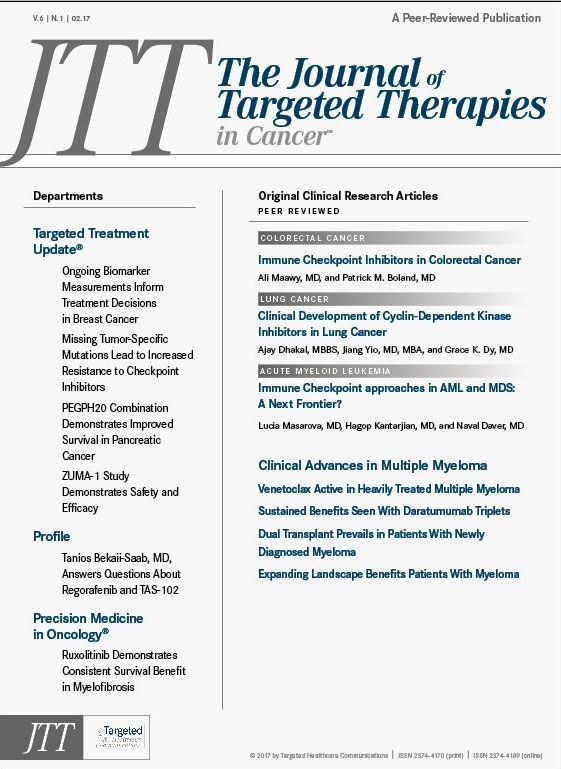Axicabtagene Ciloleucel Demonstrates Safety and Efficacy in Lymphoma
Results from the phase I portion of the first trial testing axicabtagene ciloleucel, an autologous CD3ζ/CD28-based CAR T-cell therapy, indicate that the regimen can safely be administered and lead to durable CR after more than 12 months in refractory diffuse large B-cell lymphoma.
Frederick Locke, MD
Results from the phase I portion of the first trial testing axicabtagene ciloleucel (KTE-C19), an autologous CD3ζ/CD28-based chimeric antigen receptor (CAR) T-cell therapy, indicate that the regimen can safely be administered and lead to durable complete remission (CR) after more than 12 months in patients with refractory diffuse large B-cell lymphoma (DLBCL). Frederick Locke, MD, a medical oncologist at Moffitt Cancer Center, Tampa, Florida, and colleagues reported an overall response rate of 71% (5 of 7 patients) including 4 patients who developed a rapid CR within 1 month of treatment. The treatment was durable, with 43% (3 patients) remaining in complete remission after one year. The results of this phase 1 study led to the initiation of the pivotal ZUMA-1 phase 2 registration trial.
“The overall and complete response rate in this small group of patients is remarkable, as the expected complete response rate for such patients is 8% with conventional chemotherapies,” said Locke in a statement. “This is truly an exciting time for the oncology community and our patients. Engineered immune cell therapies are one step closer to widespread availability,” added Locke, who is director of Research for Moffitt’s Immune Cell Therapy Clinical Trial Group.
Axicabtagene ciloleucel, developed by Kite Pharma, is an autologous CAR T-cell therapy in which T cells are isolated from a patient’s blood and engineered to target the CD19 protein that is found on lymphoma cells. The re-targeted T cells are then infused back into the same patient.
The researchers demonstrated that the conditioning regimen of cyclophosphamide at 500 mg/m2 and fludarabine at 30 mg/m2 followed by axicabtagene ciloleucel is safe for further study with manageable toxicity. In the multicenter ZUMA-1 phase 1 study, patients received chemotherapy with concurrent cyclophosphamide and fludarabine chemotherapy (500 mg/m2) for 3 days, followed by KTE-C19 at a target dose of 2 x 106 CAR T cells/kg.
Eligible patients had ECOG performance status of 0 or 1, absolute neutrophil count of ≥1,000/mL, and platelet count of ≥50,000/mL. Patients must have had all of the following: (1) histologically confirmed B-cell non Hodgkin lymphoma, including diffuse large B-cell lymphoma (DLBCL) not otherwise specified, primary mediastinal large B-cell lymphoma, or transformed follicular lymphoma (TFL); (2) chemotherapy refractory disease; (3) prior therapy must have included an anti-CD20 monoclonal antibody-containing regimen and an anthracycline-containing chemotherapy regimen; for patients with TFL, prior chemotherapy for follicular lymphoma and subsequent refractory disease after transformation to DLBCL; (4) at least 1 measurable lesion; (5) no evidence of central nervous system lymphoma by magnetic resonance imaging; and (6) ≥2 weeks since prior radiation therapy or systemic therapy at the time of leukapheresis.
The researchers also concluded that cryopreserved KTE-C19 is associated with robust CAR T-cell expansion and durable clinical responses that are similar to those observed with fresh anti-CD19 CAR T-cell therapy in studies conducted at single institutions. Three patients were refractory to second-line or later lines of therapy, and 4 patients had relapsed post autologous stem cell transplantation (ASCT) within 1 year. Two of the 4 patients who relapsed post ASCT received another regimen before enrollment: patient 4 had stable disease after 3 cycles of R-GEMOX and patient 6 had progressive disease after 2 cycles of ipilimumab and lenalidomide therapy, meeting the definition of refractoriness as defined in the protocol.
The investigators reported that all patients experienced KTE-C19-related adverse events of any grade, with grade 3 and 4 events reported in 4 (57%) and 1 (14%) patient(s), respectively. No patient had a grade 5 KTE-C19-related event. B-cell aplasia and hypogammaglobulinemia was observed in 3 patients.
This is the first multicenter study of a CAR-T therapy that was produced at a centrally located facility. The manufacturing process for axicabtagene ciloleucel (KTE-C19) was successful for all of the patients and was completed within approximately 2 weeks.
Reference:
Locke FL, Neelapu SS, Bartlett NL, et al. Phase 1 results of ZUMA-1: a multicenter study of KTE-C19 anti-CD19 CAR T cell therapy in refractory aggressive lymphoma.Molecular Therapy. 2017;25(1):285-295.

Examining the Non-Hodgkin Lymphoma Treatment Paradigm
July 15th 2022In season 3, episode 6 of Targeted Talks, Yazan Samhouri, MD, discusses the exciting new agents for the treatment of non-Hodgkin lymphoma, the clinical trials that support their use, and hopes for the future of treatment.
Listen